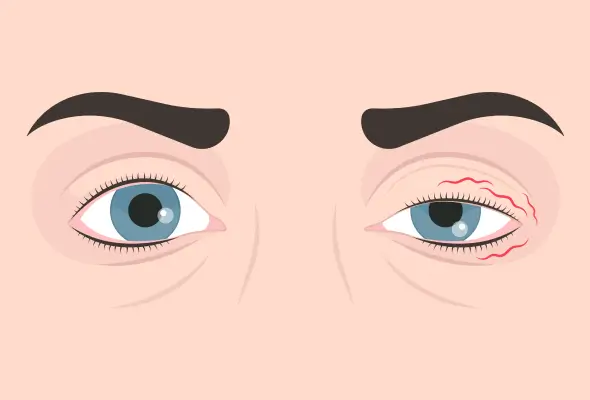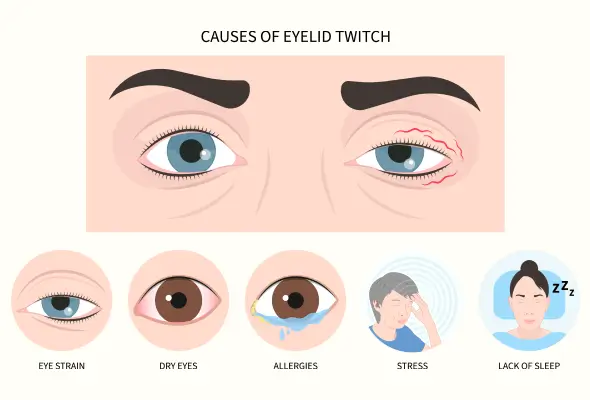-
Doctors
-
Specialities & Treatments
Centre of Excellence
Specialties
Treatments and Procedures
Hospitals & Directions HyderabadCARE Hospitals, Banjara Hills CARE Outpatient Centre, Banjara Hills CARE Hospitals, HITEC City CARE Hospitals, Nampally Gurunanak CARE Hospitals, Musheerabad CARE Hospitals Outpatient Centre, HITEC City CARE Hospitals, Malakpet
HyderabadCARE Hospitals, Banjara Hills CARE Outpatient Centre, Banjara Hills CARE Hospitals, HITEC City CARE Hospitals, Nampally Gurunanak CARE Hospitals, Musheerabad CARE Hospitals Outpatient Centre, HITEC City CARE Hospitals, Malakpet Raipur
Raipur
 Bhubaneswar
Bhubaneswar Visakhapatnam
Visakhapatnam
 Nagpur
Nagpur
 Indore
Indore
 Chh. Sambhajinagar
Chh. SambhajinagarClinics & Medical Centers
Book an AppointmentContact Us
Online Lab Reports
Book an Appointment
Consult Super-Specialist Doctors at CARE Hospitals

Eye Twitching
Symptom, Causes, Diagnosis and Treatment
Eye Twitching
What Causes Eye Twitching & How to Stop It
Have you ever experienced an annoying twitch in your eye that won't stop? Eye twitching is among the most common eye conditions that affect many people. This involuntary eyelid movement can range from a mild annoyance to a more severe problem. While it's usually harmless, understanding the causes and remedies for eye twitching can help you manage this bothersome issue.
Let's explore the different types of eye twitches, including right eye twitching, and delve into the various reasons for eye twitching. We'll also discuss eye-twitching causes, potential treatments, and home remedies that may provide relief. Whether you're dealing with occasional twitches or a more persistent eye-twitching disease, this guide aims to shed light on the condition and offer practical solutions to help you find comfort.

What is Eye Twitching?
Eye twitching disease, also known as blepharospasm, is an involuntary movement of the eyelid that can affect one or both eyes. It's a common condition that many people experience at some point in their lives. The twitching usually starts as small, occasional movements in the eyelid. For most individuals, it's a temporary problem that resolves on its own. However, in some cases, particularly with benign essential blepharospasm, the twitching can become more frequent and worsen over time. This progression may lead to the eyes closing completely, making everyday tasks like reading or driving challenging.
Types of Eyelid Twitches
Eye twitching can manifest in different forms, with its characteristics and potential causes.
- Eyelid Twitch: This type is common, generally harmless, and usually resolves within a few days. Also known as minor eyelid twitch, it is typically a unilateral slight spasm of the lower or upper eyelid, or occasionally both eyelids. It's often associated with a lack of sleep, stress, or excessive caffeine intake.
- Essential Blepharospasm: It is a more severe form of eye twitching. It's an involuntary condition affecting both eyes. It starts as an increased blink rate and eventually leads to closing the eyelids and squeezing the muscles around the eyes.
- Hemifacial Spasm: This unique type involves involuntary eye closure along with muscle contractions in the cheek, mouth, and neck, but only on one side of the face. It usually begins with intermittent eye twitching and progresses to affect other facial muscles.
Causes and Risk Factors of Eye Twitching
Some of the common eye-twitching causes are:
- Stress and anxiety
- Fatigue and lack of sleep
- Excessive caffeine intake
- Alcohol consumption and smoking
- Bright lights or light sensitivity
- Eye strain, often caused by prolonged screen time or reading
- Dry or irritated eyes and conditions like conjunctivitis or blepharitis
In rare cases, eye twitching can be associated with more serious conditions. These include:
- Neurological disorders like Parkinson's disease, multiple sclerosis, or brain damage
- Certain medications, particularly those used to treat psychosis, epilepsy, Tourette syndrome, or migraines, may also cause eye twitching as a side effect.

Symptoms of Eye Twitching
Eye twitching can manifest in various ways, ranging from mild annoyances to more severe symptoms. The most common sign is an involuntary movement of the eyelid, which can affect one or both eyes. These twitches often occur in the upper eyelid but can also involve the lower lid.
Besides the characteristic eyelid spasms, other symptoms may include:
- Eye irritation
- Increased blinking rate
- Light sensitivity
- Dry eyes or vision problems
- In more severe cases, facial spasms may occur alongside eye twitching.
Diagnosis of Eye Twitching
Diagnosing eye twitching typically involves a thorough examination by a doctor. Doctors will analyse your medical history and perform a physical assessment, which often includes a comprehensive evaluation of your nervous system and eyes.
In some cases, ophthalmologists will look for any underlying causes of the twitching, such as stress or side effects from medication.
In certain situations, your doctor might recommend radiological investigations like a CT scan or MRI to rule out other medical conditions that could be causing the eye twitching.
Treatment For Eye Twitching
Treatment for eye twitching varies and depends on the underlying cause & severity of the condition. For most people, minor eye twitches resolve on their own within a few days or weeks. However, several eye twitching treatment options are available if the twitching persists or becomes disruptive, such as:
- For less severe cases, lifestyle changes can help alleviate symptoms. Reducing caffeine intake, getting adequate sleep, and managing stress are often beneficial.
- A warm compress on the eyes and using over-the-counter artificial tears can relieve irritation and dryness.
- Botulinum toxin injections are considered the most effective treatment for severe cases of eye twitching, particularly for conditions like blepharospasm and hemifacial spasm.
- In some cases, doctors recommend medications to help control eye twitching. These can include muscle relaxants, anticonvulsants, or certain antidepressants.
- For cases that don't respond to other treatments, doctors recommend surgical options like myectomy. In this procedure, the surgeon removes some of the muscles or nerves responsible for the twitching.
When to See a Doctor
While eye twitching is often harmless, there are instances when seeking medical advice is necessary, such as:
- If your eye twitching persists for more than two weeks
- If the twitching occurs in multiple areas
- If you experience additional symptoms, such as weakness or stiffness in the affected area.
- If the twitching interferes with your daily life or affects your vision.
- If you notice new symptoms alongside the eye twitching, such as other facial spasms or discharge from your eye
Home Remedies for Eye Twitching
Several eye twitching remedies that can help alleviate the symptoms are:
- A warm compress application on the affected eye for 5-10 minutes can immediately relax the muscles and reduce spasms.
- Practising relaxation techniques like meditation, deep breathing, or yoga can help lower stress levels.
- Getting enough sleep is also essential, aiming for at least 7-8 hours per night.
- Lowering caffeine intake can make a significant difference.
- Staying hydrated is essential. Aim to drink 10-12 cups of water daily to keep your body and eyes healthy.
- Over-the-counter artificial tears can also help if dry eyes contribute to the twitching.
Prevention
Preventing eye twitching involves making lifestyle changes and addressing potential triggers.
- Sticking to a regular sleep schedule is of utmost importance, as fatigue often worsens this condition. Aim for at least seven hours of sleep per night and maintain a consistent sleep schedule, even on weekends.
- Gradually cut back on coffee, tea, chocolate, and fizzy drinks to minimise the risk of eye twitching. Similarly, limiting alcohol consumption can help prevent this issue.
- Regular exercise can help decrease stress and promote overall well-being.
- If digital eye strain is the culprit, follow the 20-20-20 rule. This rule says that after every 20 minutes of working on a screen, look at something 20 feet away for a minimum of 20 seconds. This practice can give your eyes a much-needed break from screen time.
- Follow proper hygiene if you are wearing contact lenses and give your eyes regular breaks.
- If you notice that certain activities or habits trigger your eye twitching, try to avoid or minimise them.
Conclusion
Eye twitching, while often a minor annoyance, can significantly impact daily life when persistent. While most cases of eye twitching are harmless, it's crucial to pay attention to persistent or severe symptoms. From stress and fatigue to more serious underlying health issues, understanding the root cause is key to finding effective solutions. Whether through simple lifestyle changes or medical interventions, there are ways to manage and prevent eye twitching. By staying informed and proactive, you can take steps to keep your eyes healthy and twitch-free, ensuring clearer vision and greater comfort in your daily activities.
FAQs
1. What does it mean if your eye twitches?
Eye twitching, or blepharospasm, is when eyelid muscles contract and relax repeatedly. It's often a sign of stress, fatigue, or excessive caffeine intake. In most cases, it's harmless and resolves on its own. However, persistent twitching could indicate an underlying condition or nutritional deficiency.
2. What deficiency causes eye twitching?
While direct research hasn't linked vitamin deficiencies to eye twitching, some nutrients may play a role. A lack of vitamin B12, D, or magnesium could contribute to eye twitching. These essential nutrients support nerve function and muscle contraction. Ensuring a balanced diet enriched in these nutrients may help prevent eye twitching.
3. Is experiencing eye twitching harmful?
Generally, eye twitching is not harmful. It's usually a minor, passing annoyance that resolves without treatment. However, if the twitching persists for more than two weeks, affects your vision, or is accompanied by other symptoms like drooping eyelids or facial spasms, it's advisable to consult a doctor.
4. What disease starts with eye twitching?
While eye twitching is rarely a sign of a serious condition, sometimes, it can be an early symptom of neurological disorders. Conditions such as Bell's palsy, dystonia, multiple sclerosis, or Parkinson's disease may start with eye twitching. However, these instances are rare, and most eye twitches are benign.
5. How long can eye twitching last?
The duration of eye twitching can vary. Most episodes last a few seconds to a few minutes and resolve within a few days or weeks. However, in some cases, chronic twitching can persist for longer periods. If your eye twitching lasts more than two weeks, seeking medical advice to rule out any underlying issues is recommended.
Still Have a Question?




